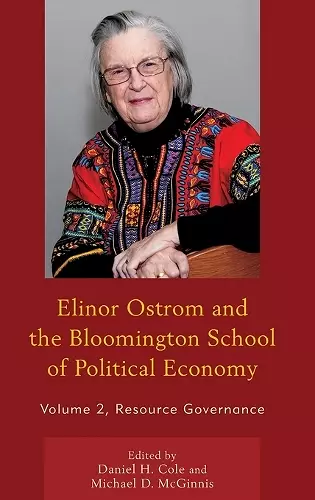Elinor Ostrom and the Bloomington School of Political Economy
Resource Governance
Daniel H Cole editor Michael D McGinnis editor
Format:Hardback
Publisher:Lexington Books
Published:4th Sep '15
Currently unavailable, and unfortunately no date known when it will be back

In addition to winning the 2009 Nobel Prize in Economic Sciences for her path-breaking research on “economic governance, especially the commons,” Elinor (Lin) Ostrom also made important contributions to other fields of political economy and public policy. This four-volume compendium of papers written by Lin (often with coauthors, most notably her husband, Vincent), along with papers by others expanding on her work, brings together the strands of her entire empirical, analytical, theoretical, and methodological research program. Together with Vincent’s important theoretical contributions, they defined a distinctive “Bloomington School” of political-economic thought. Volume 2 examines Lin’s work on “the commons,” in which she demonstrated that, in many cases, local resource users can solve collective-action problems through common-property management regimes. It comprises papers, including some that are not well known, related to and building on the findings of Governing the Commons (1990). Part I focuses on key attributes of biophysical resources and the institutions human communities have designed to govern them. Part II shows how in various social and ecological circumstances, different sets of institutions facilitate or impede the long-run sustainability of resources. Part III highlights Ostrom’s first major research project on water resources in Southern California. It was a topic she (and her students) returned to with the specific intention of gathering data (more than 50 years’ worth) for longitudinal analyses of combined institutional and ecological change. In sum, this volume contextualizes what is, at present, thought to be Lin’s greatest legacy to social science: the conditions under which resources can be sustainably managed over very long periods of time by the collective action of ordinary people, beyond markets and states.
This edited volume serves an important need, unmet until its publication. The carefully selected works included in the book coherently showcase the key ideas and assumptions that underlie research on CPR management by Elinor Ostrom and other Bloomington School scholars and inform the design principles identified in Governing the Commons (Ostrom, 1990).... The Resource Governance volume, thus, serves two complementary purposes. First, the volume lays a foundation for probing the institutional settings in which voluntary behavior occurs for the management or delivery of community goods and services. Second, the volume has interdisciplinary appeal as a teaching text for courses on nonprofit organizations, voluntary action, and public policy, among many others. By reading this volume, students will learn about the evolution of a highly regarded research program and the key concepts motivating related studies. They will also be able to identify biophysical and social factors that both shape and are shaped by institutions governing collective action. * Nonprofit and Voluntary Sector Quarterly *
Daniel Cole and Michael McGinnis have done a magnificent job in putting together the most comprehensive, best structured and most representative collection of works that define the core ideas and insights of the Bloomington School. -- Paul Dragos Aligica, George Mason University
This volume is the perfect companion to Elinor Ostrom’s pathbreaking Governing the Commons. Here you will find papers published before and after she wrote that book, revealing how and why her thinking about natural resource governance developed over time. I found this volume to be loaded with insight, and shining with inspiration. -- Scott Barrett, Columbia University
This second volume on the Bloomington School of Political Economy brings together the key contributions of the Ostroms and their colleagues to understanding natural resource governance more insightfully. Combining older and more recent writings, the collection marks highlights, and also traces a genealogy of the writings of Elinor Ostrom. It will find a place in the shelves of all serious scholars and students of the subject. -- Arun Agrawal, University of Michigan
ISBN: 9780739191088
Dimensions: 236mm x 159mm x 37mm
Weight: 789g
444 pages